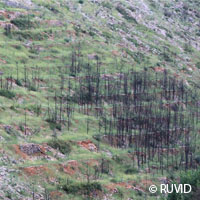Europeans offer solutions to beat forest and land desertification
EU-funded researchers are on a quest to fight desertification in dry forests and agricultural lands that dot the Mediterranean region and China, an effort that fuels the initiative of the International Year of Forests, a global platform that targets the sustainable management of the world's forests. The LEDDRA ('Land and ecosystem degradation and desertification: assessing the fit of responses') project is backed with almost EUR 3.1 million under the Environment Theme of the EU's Seventh Framework Programme (FP7). Efforts to suppress the process by which land becomes increasingly arid until no vegetation grows will effectively bolster economic development and create jobs in rural areas, experts say. Headed by the Research Unit of the University of the Aegean in Greece, the LEDDRA consortium brings together experts from China, Germany, Greece, Italy, Morocco, the Netherlands, Spain and the United Kingdom to advance the comprehensive study of the socio-environmental fit of responses to land and ecosystem degradation and desertification (LEDD) in several contexts. Ultimately, sharing multidisciplinary experiences for studying responses to soil degradation in forests, pastures, croplands and shrublands is key. Taking an ecosystem approach, the project partners are using an integrated methodology to deal with and respond to environmental, socioeconomic and institutional conditions that contribute to or detract from sustainable land management and societal welfare. The team is also assessing the associated costs and benefits to diverse stakeholders, barriers to and opportunities for adoption, and knowledge transfer processes, according to the partners. Specific areas being evaluated by the LEDDRA project are found in China, Greece, Italy, Morocco, Portugal and Spain. The partners have already found that the areas in question, which are impacted by arid and semi-arid climatic conditions and have been occupied by people for many years, show desertification processes that have reduced water and soil availability. 'Good management will allow the recovery and conservation of both elements,' says Professor Artemi Cerdà of the University of Valencia in Spain, a LEDDRA partner. To 'assess whether policies are being efficient is the work of LEDDRA.' Only the solid management of existing forests can ensure soil conservation and water resources, according to the team. 'And forest policies should be extended to agricultural areas where there is a high loss of soil and water as a result of excessive ploughing and use of herbicides,' says Professor Cerdà. The team points out that using the biomass of abandoned areas and farms that respect the conservation of resources helps provide and maintain work and income for people living in these areas. 'The recovery of the values of the mountains as producers of high quality air and water, its capacity to sequester carbon dioxide (CO2), generate high quality products such as organic food, and jobs is the basis for combating desertification,' the Valencia researcher says. Furthermore, it is possible to recover an ancient landscape and avert disastrous fires if mountain areas, forests and crops are sustained. Part of the work carried out by the Valencia team for the LEDDRA project indicates that highly intensive agricultural practices, based on chemical agriculture, lead to soil degradation and speed up the loss of soil. So using various strategies to protect the soil and increase the quality of soil and water would be advantageous for these regions. 'The government policies and the goals of commercial producers are designed at short term,' Professor Cerdà says, 'Therefore, management strategies employed in agriculture lead to land degradation. LEDDRA studies such negative strategies for sustainability.' The LEDDRA partners note that preventing overgrazing, maintaining traditional irrigation, following a type of agriculture based on recycled organic matter and ensuring that no urbanisation takes place on agricultural and forest lands are just some ways to protect the areas. The team adds that prevention practices should be carried out during the winter seasons. 'High intensity fires, the summer ones, should be avoided,' Professor Cerdà concludes. 'It is therefore essential to conduct prescribed fires in order to lighten forest biomass or to create open areas. Only then we will prevent uncontrolled summer fires that are dangerous for all types of life and property and, in turn, cause soil degradation.'For more information, please visit:LEDDRA:http://ecologic.eu/3354RUVID Association:http://www.ruvid.org/mision1_in.phpInternational Year of Forests:http://www.un.org/en/events/iyof2011/
Countries
China, Germany, Greece, Spain, Italy, Morocco, Netherlands, Portugal, United Kingdom



